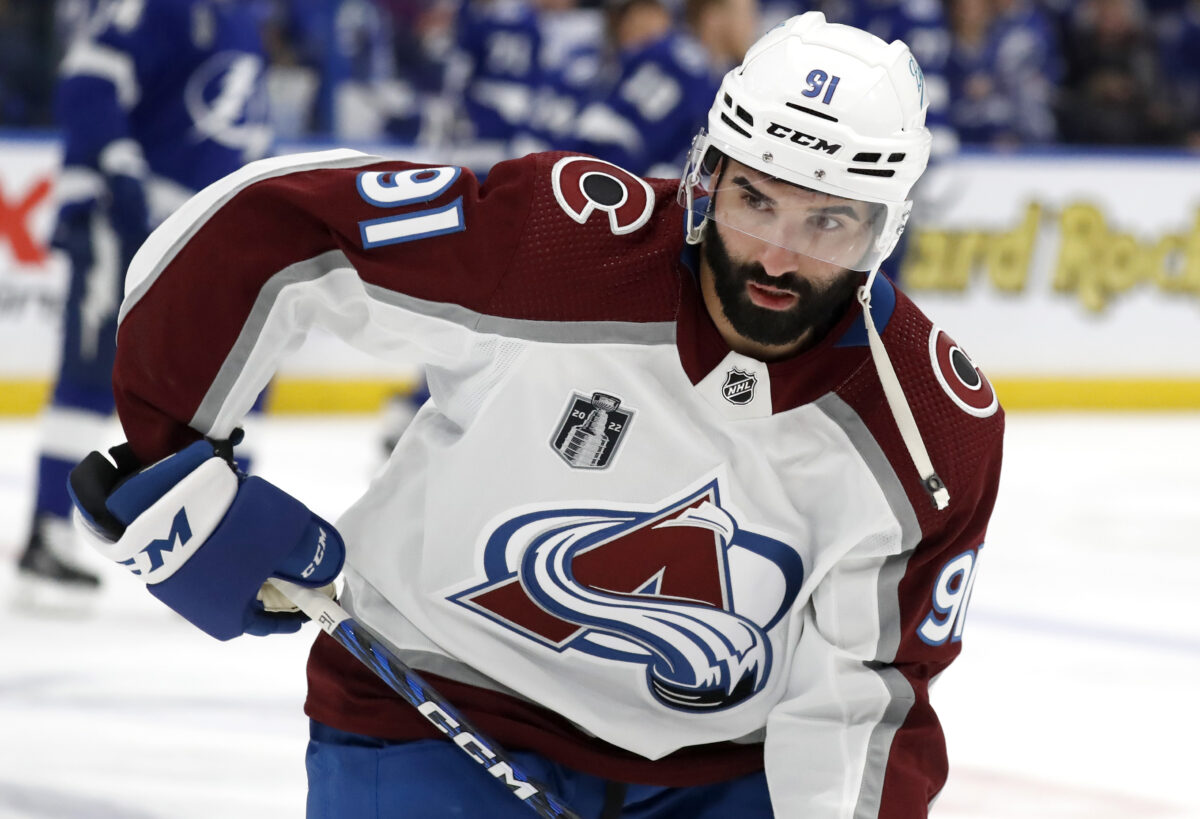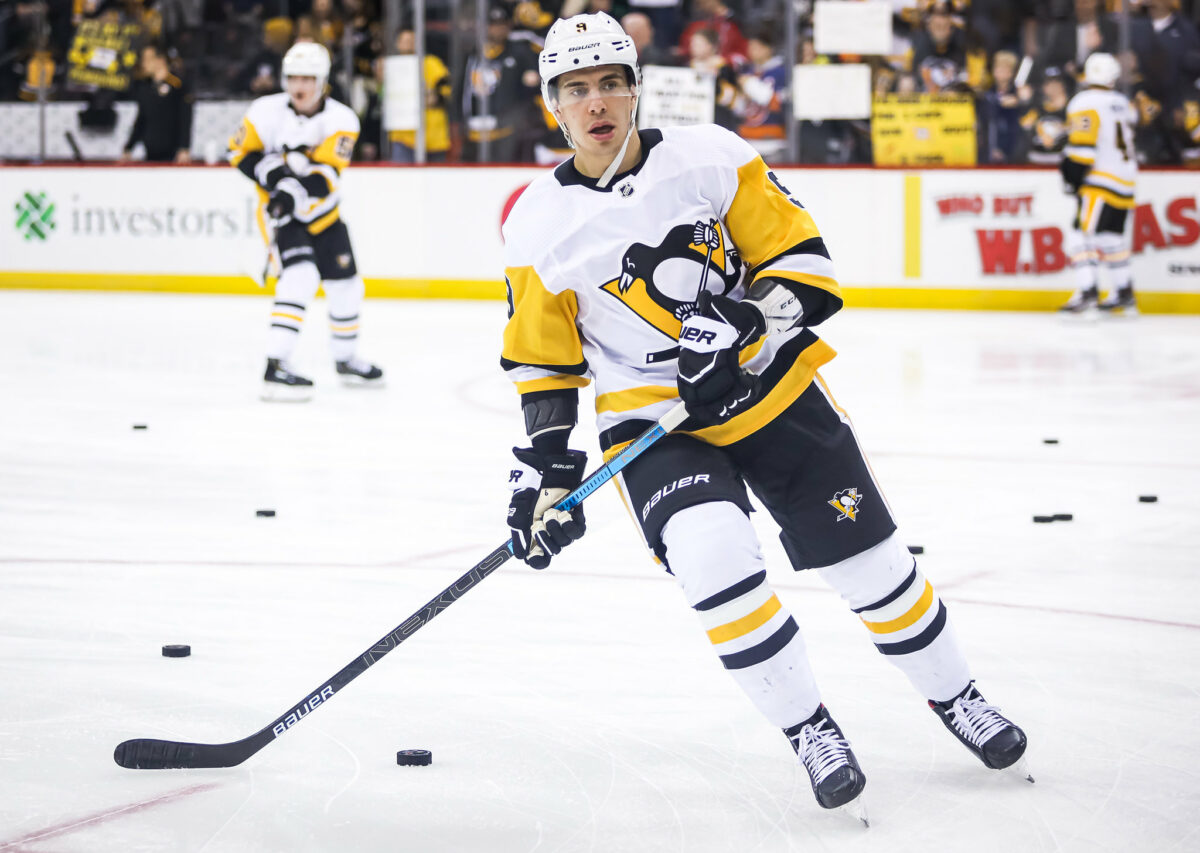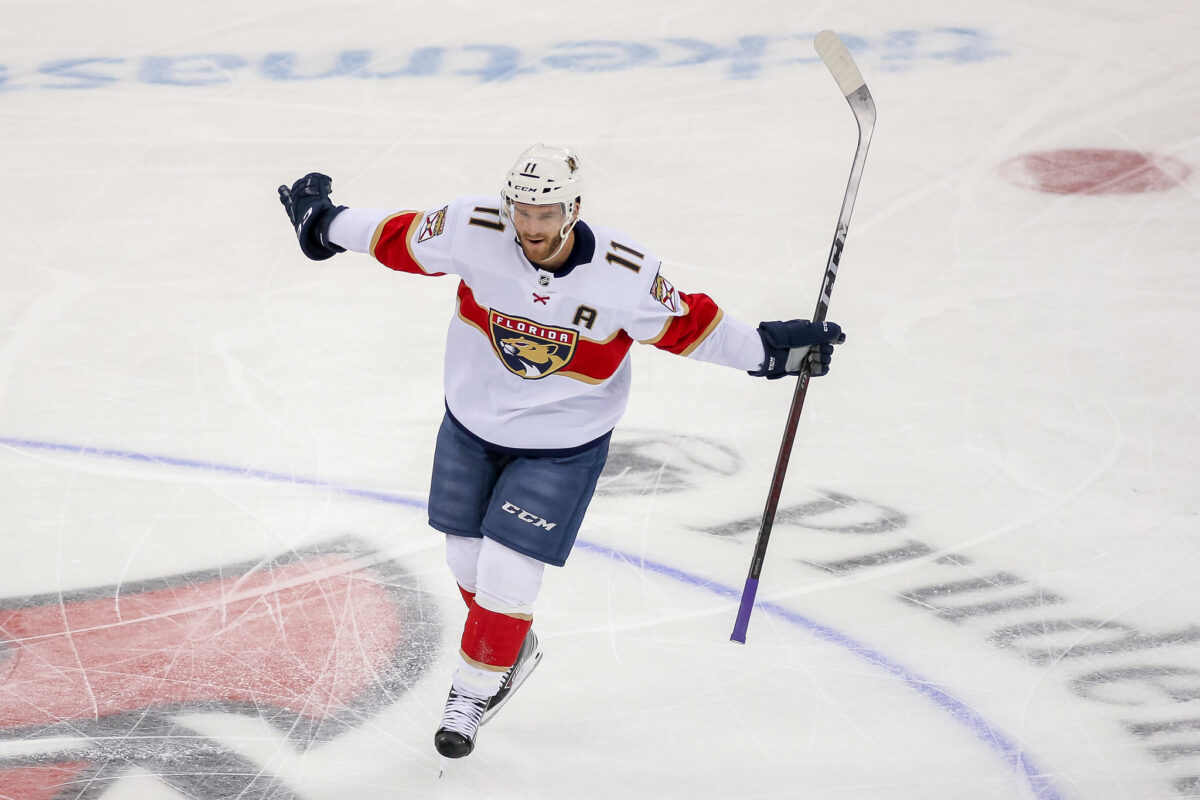After years of frustrating postseason losses, the Colorado Avalanche finally slayed their demons and captured the first Stanley Cup of the Nathan MacKinnon era, and the third in franchise history. Employing a breakneck strategy revolving around speed in all three zones, the Avalanche tore through the Western Conference and eventually toppled the dynasty-in-waiting in the Tampa Bay Lightning. After the highs of a championship wore off, the Avalanche watched as several key contributors cashed in during free agency and endured an offseason of significant change.
With the 2022-23 season just around the corner, the reigning champions are preparing for a title defence. Despite maintaining their status as Cup favourites heading into the season, repeating the feat is sure to be a herculean task. I wrote an article arguing why the Avalanche will repeat, but now I take the stand to represent the opposing side of the debate. Here are four reasons why the Avalanche will not win the 2023 Stanley Cup.
Avalanche Can’t Replace Kadri as Second-Line Center
A significant contributing factor to their successful 2021-22 campaign was the unexpected breakout season enjoyed by 31-year-old center Nazem Kadri. He shattered his previous career-highs in almost every offensive category, notching 87 points in 71 regular-season games (28 goals and 59 assists) and tacked on another 15 points in 16 playoff appearances. He was lauded for his performance and was named a participant in the 2022 All-Star Game. For the Avalanche, they now had a true second-line center who could shoulder some of the offensive burden and function as a reliable supporting pivot behind MacKinnon.

Unfortunately, as a pending unrestricted free agent (UFA), Kadri leveraged his increased production into a seven-year, $49 million deal with the Calgary Flames after the Avalanche were unable and unwilling to accommodate his demands. Consequently, the Avalanche are left with a hole at the second-line center spot and have a few interesting, but uncertain options to replace him this season.
First is 27-year-old utility man J.T. Compher, often the first choice to assume Kadri’s position when he was out of the lineup during the playoffs. He stepped up and posted eight points in 20 playoff games – including several important goals – but his offensive limitations cap his long-term ceiling as a third-line center when everyone is healthy.
You May Also Like:
- Seguin & Stankoven Lead Stars to 4-1 Win Over Avalanche in Game 3
- Projected Lineups for the Stars vs Avalanche – Game 3
- Stars Survive 3rd Period Comeback by the Avalanche in Game 2, Win 5-3
- Projected Lineups for the Avalanche vs Stars – Game 2
- Nathan MacKinnon Deserves to Win First Hart Trophy
Next is Alex Newhook, a 21-year-old forward who has yet to find his best position at the NHL level. Despite being drafted as a center, he has bounced between the wing and the middle of the ice during his time with the Avalanche. He’s shown flashes of potential (33 points in 71 games last season) and should see increased usage in the aftermath of Kadri’s departure. Yet, he’s raw and untested in a top-six role, meaning some growing pains could precipitate any offensive success.
The third candidate to replace Kadri is center Evan Rodrigues, recently signed as a free agent away from the Pittsburgh Penguins after a surprising 43-point campaign. The 29-year-old helped to keep the Penguins afloat while Sidney Crosby and Evgeni Malkin recovered from offseason surgery during the first half of the 2021-22 season. Before Malkin returned in mid-January, Rodrigues tallied 30 points in 35 games on over 12% shooting (SH%), good enough for 44th in NHL scoring. In the 47 games afterwards, his production dropped significantly, only scoring 13 points the rest of the season.
Even while considering his inconsistency, Rodrigues’ sparkling micro-stat profile describes him as a threat in transition and someone who can generate quality chances for his teammates. How well he fares with the Avalanche depends on which of the two versions of Rodrigues from 2021-22 most closely resembles his true talent level.

The fourth and final option for the Avalanche is to have star winger Mikko Rantanen slide over to the middle, as he did several times during their Stanley Cup run. Hockey is slowly transitioning to a more positionless sport and as long as he demonstrates some semblance of defensive accountability, the Avalanche should be able to function with him at center ice. Whether it’s worth separating him from MacKinnon is the deciding factor, and the play of the other three center candidates could dictate how comfortable the Avalanche are with taking that risk.
As is evidenced by the bevy of options on hand for the Avalanche, their second-line center position is unsettled heading into the 2022-23 season. One of the four candidates could take the role in stride and replicate Kadri’s impact, but odds are the team will see some dropoff during the transition.
Georgiev Struggles as Avalanche’s New Starting Goalie
Come opening night, the Avalanche will look different in the crease. Backup Pavel Francouz remains but Darcy Kuemper – last season’s starter – inked a five-year, $26.25 million contract with the Washington Capitals. In his stead is 26-year-old Alexandar Georgiev, acquired from the New York Rangers for a bouquet of draft picks. The Russian netminder boasts 129 NHL appearances to his name, but he has never played more than 34 games in a single season due to the fact of playing behind both Henrik Lundqvist and Igor Shesterkin. It’s possible that he splits the net with Francouz, but the three-year extension he was promptly handed upon joining the team suggests he sits higher in the organizational hierarchy.
Even so, there are legitimate concerns about how Georgiev will fare with the Avalanche given recent developments. The first three years of his NHL tenure saw him post dependable numbers for a promising young goalie. The past two seasons – potentially fueled by uncertainty brought on by playing behind Shesterkin and numerous trade rumours – have seen his stock tumble, with his results more resembling those belonging to a middling backup.
| Stat | 2017-2020 | 2020-2022 |
|---|---|---|
| Games Played | 77 (48) | 52 (42) |
| SV% | .913 (28) | .901 (42) |
| HDSV% | .837 (8) | .798 (47) |
| GSAx | 13.28 (12) | -8.65 (34) |
Given the Avalanche’s elite team defence and New York’s poor five-on-five play (22nd in expected goals share last season), Georgiev’s history with the Rangers may not be as great a cause for concern. Colorado is one of the few teams capable of insulating him and relying on their star talent to outscore their opposition, as they did many times with Kuemper last season. Still, uncertainty permeates the air in Denver and it remains to be seen whether Georgiev will repay the organization’s faith in him in full. If the Georgiev of the past two seasons is the real version, the 2022-23 season could be a rocky one for the defending champions.
Other Western Conference Contenders Drastically Improve
A factor that is nearly as important as a team’s overall talent level is the strength of their immediate competition. The rest of the Western Conference improved just enough this offseason to turn up the pressure on the Avalanche, even if the Eastern Conference still reigns supreme on the whole. Although the Edmonton Oilers, Minnesota Wild, and St. Louis Blues remain potential threats for a myriad of reasons, the Flames and Vegas Golden Knights are the most threatening challengers to the Avalanche’s claim to the throne in 2022-23.
The Flames began the offseason by losing Johnny Gaudreau in free agency and traded Matthew Tkachuk for Jonathan Huberdeau and MacKenzie Weegar, transforming a core beleaguered by a string of disappointing seasons. While Weegar adds to what is already a team strength in their defence, acquiring Huberdeau (set the single-season record for assists by a left winger) as well as Kadri introduces a new dynamic to the roster. Playmaking winger Sonny Milano also received an invite to training camp and could inject additional creativity further down the lineup. By tempting Kadri away as a free agent, the Flames directly weakened the Avalanche while bolstering their own fortunes. With the Avalanche yet to identify a long-term solution to the hole left by Kadri, that move could singlehandedly alter the Western Conference landscape.

After an injury-riddled campaign in which all of their stars missed significant time, the Golden Knights return to the forefront of the Western Conference playoff picture this season. Despite having to shed Max Pacioretty and Dylan Coghlan (but signing Phil Kessel) to alleviate their salary cap concerns, a clean slate for the likes of Mark Stone, Alex Pietrangelo, and Jack Eichel should pay dividends for the last team to defeat the Avalanche in a playoff series. Starting goaltender Robin Lehner is set to miss the entire 2022-23 season, and the ensuing competition in the crease could dampen their Cup aspirations.
It doesn’t take anything away from their success to suggest that the Avalanche were fortunate – as are all Stanley Cup winners to some degree – last season. Winning a title demands that championship hopefuls capitalize on opportunities as they present themselves, something they did emphatically in 2021-22. Still, a realistic appraisal of the Western Conference suggests that the road to a second-consecutive Cup will be more harrowing than the first go-around.
Avalanche Struggle to Overcome the Stanley Cup Hangover
When it comes to navigating the grind that is a championship run, powering through injuries in pursuit of the ultimate goal is an unspoken rule within professional sports. The Avalanche experienced this phenomenon firsthand, with several key players nursing significant injuries on the way to the Cup.
Normally, the offseason provides invaluable time off for players to recover and recuperate from the rigours of the previous season. However, the Avalanche’s prolonged run cut down on that recovery time significantly with the 87 days between the conclusion of Game 6, and the opening of training camps for the 2022-23 season in September just narrowly beaten out by the 2021 offseason as the shortest in NHL history. For reference, teams who did not make the playoffs will have nearly double the time off, with 145 days between the end of the 2021-22 regular season and the opening of training camps.
Although several of the players with the most significant injuries are no longer on the team (Andre Burakovsky, Kadri, and Kuemper), the rest of the team must quickly rebound and jump back into full-speed hockey. The Avalanche must be wary of the NHL’s most dangerous cocktail in reduced recovery time, somewhat diminished motivation through the drudgery of the regular season, and significant roster turnover. As a result, it wouldn’t be a surprise to see the Avalanche stumble out of the gates and gradually ramp up their play in anticipation of another lengthy playoff run. Still, that adjustment period could introduce enough turbulence that the team never gets back up to speed.
Since the 2005-06 season, 10 of the 16 individual champions failed to make it past the second round of the playoffs in the following season, eight of the 16 didn’t make it past the first, and two of the 16 missed the playoffs entirely.
| Missed Playoffs | Lost in Round One | Lost in Round Two |
|---|---|---|
| Carolina Hurricanes (2006-07) | Anaheim Ducks (2007-08) | Pittsburgh Penguins (2009-10) |
| Los Angeles Kings (2014-15) | Chicago Blackhawks (2010-11) | Pittsburgh Penguins (2017-18) |
| Boston Bruins (2011-12) | ||
| Chicago Blackhawks (2015-16) | ||
| Washington Capitals (2018-19) | ||
| St. Louis Blues (2019-20) |
It bears mentioning that trends do not lock in a team’s fate. Considering the Avalanche’s elite cast of stars still in their prime and a (relatively) weak Western Conference, it would be a shock for them to not at least win a round. Still, stranger things have happened and recent history is not on their side when it comes to repeating as champions.
Avalanche Unlikely to Repeat as Stanley Cup Champions
There have been 10 instances of a team winning at least two consecutive Stanley Cups since the NHL transitioned into its modern era starting with the 1967-68 season, but only two such instances since the start of the 21st century. The NHL’s salary cap structure has complicated the team-building process, making it more difficult for organizations to keep their stars in the fold. Even though they enter the 2022-23 season as prospective favourites, the Avalanche will be in tough to reverse historical trends and become the third organization to win consecutive titles since 2006. For now, all eyes are on Colorado to see what they do for an encore.
Data courtesy of All Three Zones, Evolving Hockey, Hockey Reference, Natural Stat Trick, and the NHL.
